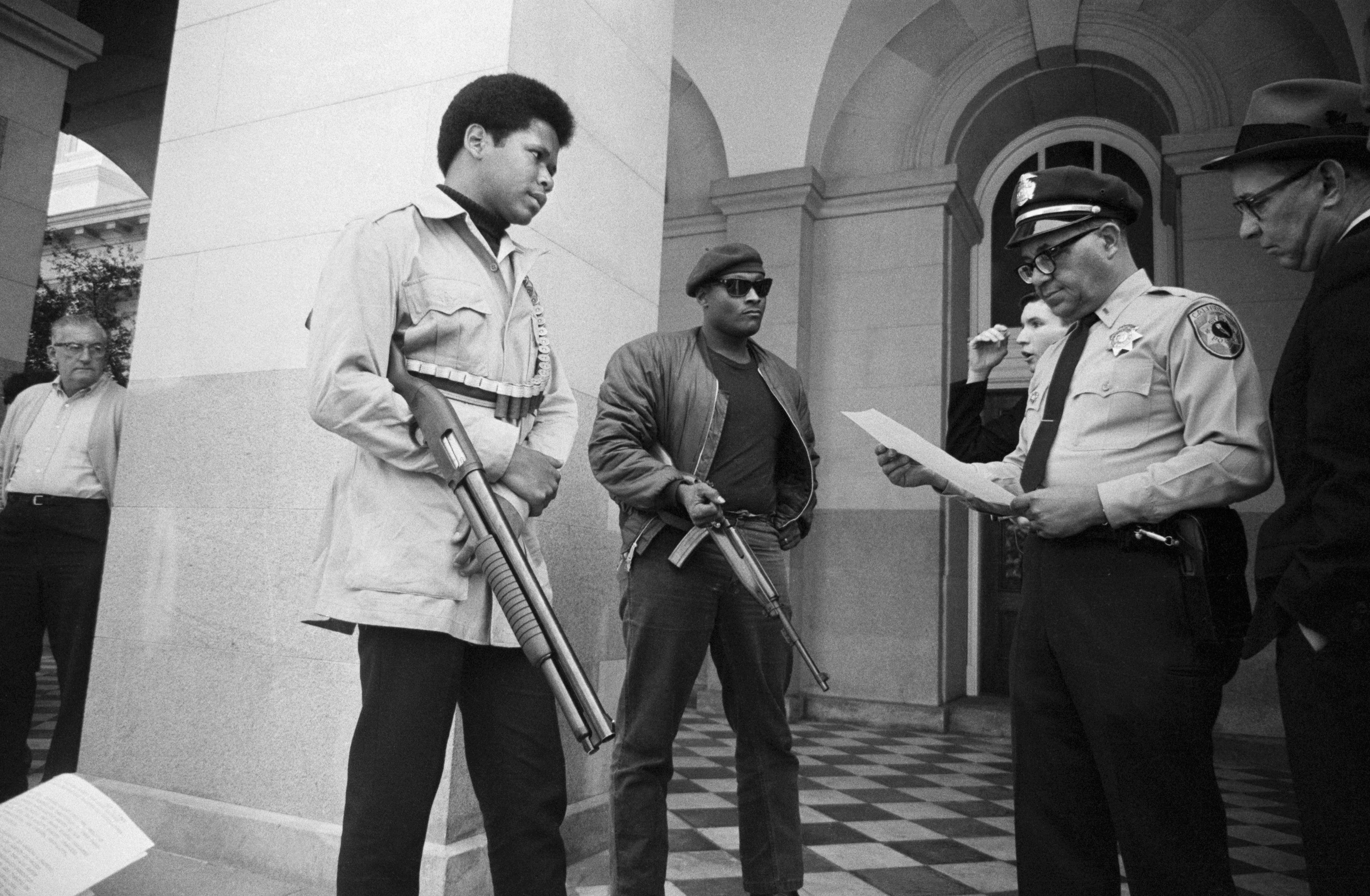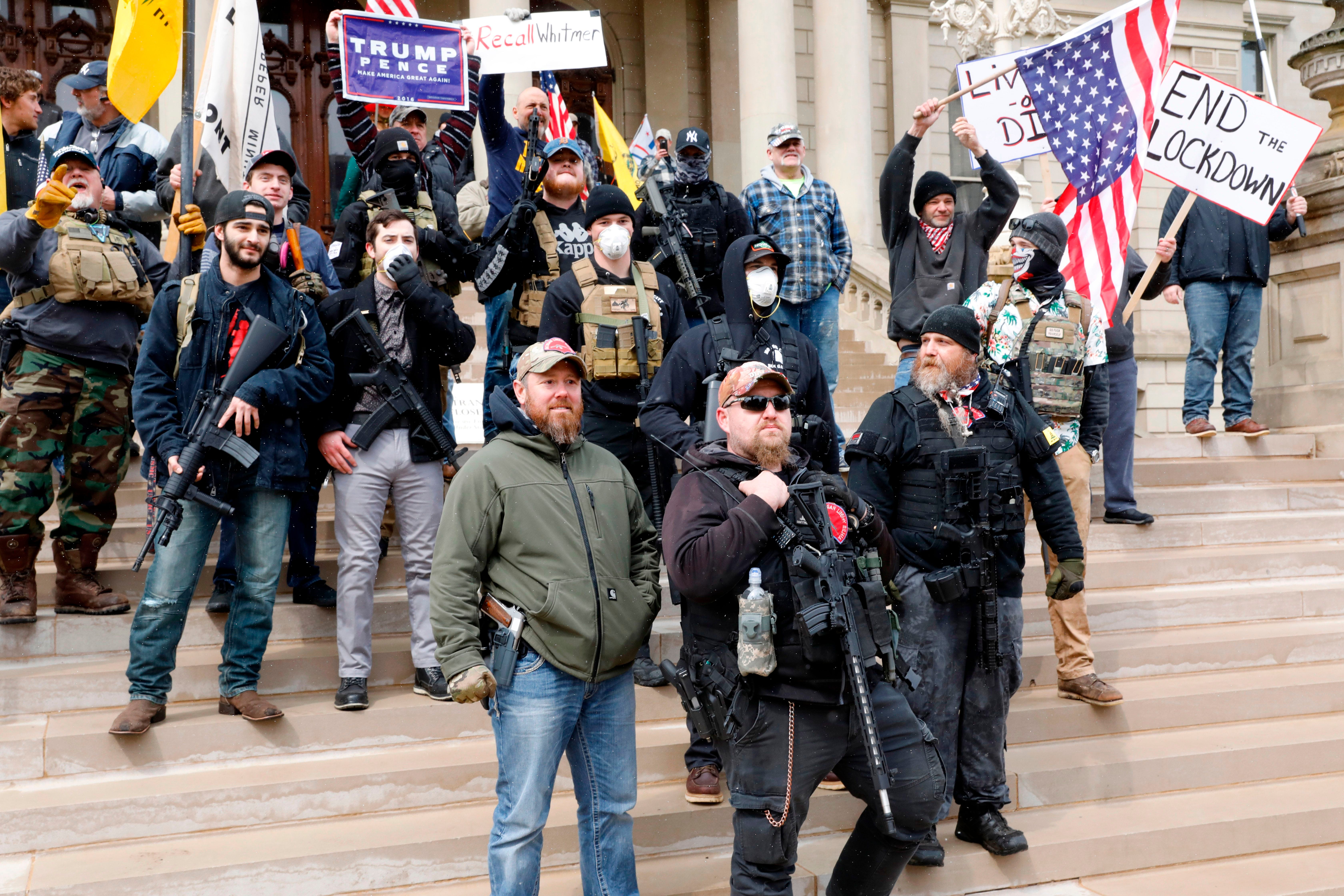
That’s a strong picture above: Members of the Black Panther Party on the steps of the California state house in 1967, armed with loaded rifles. Was your reaction physical? Did you squint your eyes, contort your face, tilt your head, maybe rock back in your seat a bit? I can imagine it, because that was my response when I saw this picture:

A group of White men, in masks, open-carrying AR-15 and AK-47 rifles on the steps of the Michigan State Capitol less than two weeks ago. What they were protesting wasn’t gun-control legislation, as the Black Panthers had been, but state governor Gretchen Whitmer’s “Stay Home, Stay Safe” executive order. At the time of the protest, it was one of the strictest measures put in place across the country in hopes of flattening the curve of the Covid-19 pandemic. Michigan is the tenth largest state in the country, but has the third most deaths in the nation behind New York and New Jersey — with more than 38,000 confirmed cases and 3,400 deaths.
This protest, “Operation Gridlock Michigan,” was organized in conjunction with Michigan Freedom Fund and Michigan Conservative Coalition, the former of which is backed by the billionaire family of Betsy DeVos, Donald Trump’s education secretary. The protesters were upset that they were not allowed to travel to in-state vacation residences or use a motorboat. They were upset that large stores had closed areas dedicated to non-survival-related items like carpeting, flooring, furniture, paint, garden centers, or plant nurseries (after all, it’s a must to plant hyacinths and tulips on the first day of spring). They called the order tyrannical, holding signs comparing Whitmer to Hitler, chanting “Lock her up!”
But that wasn’t the only image that left me unsettled. So did this one, from a follow-up protest staged in front of the governor’s residence — a home that she shares with her children.
BACKLASH: Largest Protest of Its Kind in Michigan History Occurs Outside of Governor Gretchen Whitmer’s Mansion https://t.co/wVqYsf6NmK
— Big League Politics (@bigleaguepol) April 24, 2020
Ninety miles away from the capitol building and the governor’s residence, Detroit’s Wayne County has become a nationwide hot spot for the Covid-19, with more than 7,000 confirmed cases and nearly 700 deaths due. A city where nearly 80% of residents are black, with a large working class that does not have the luxury of living in isolation. A city where, due to a long history of social and economic inequity, the coronavirus is uniquely suited to wreak havoc.
The competing perceived realities — Black people dying, White people taking up guns to protest public-health measures as “tyranny” — were distilled perfectly by Michigan attorney general Dana Nessel. “I just can’t hear about one more black health care worker, police officer, or bus driver die while getting a barrage of complaints from white folks outraged because they can’t go golfing,” she tweeted.
More importantly, why was America not more fearful of the displays? That’s not a rhetorical question, because it has an answer: Armed protest is a lot easier to swallow when it’s White and conservative.
History has a funny way of coming back around. Both the Black Panthers and these protestors were exercising their First Amendment right to peaceably assemble. Both were exercising their Second Amendment right to bear arms — except only the Panthers were doing so in a way that matched the issue being protested. The Michigan demonstrators were using their rifles, apparently, to stop a pandemic.
Just to be clear: There may not be a vaccine or even a proven treatment for Covid-19 yet, but an AK-47 is not effective either.
So what was this demonstration really about? Exercising their Second Amendment rights? Making America Great Again? Reminding people whose country they believe it belongs to?
More importantly, why was America not more fearful of the displays? That’s not a rhetorical question, because it has an answer: Armed protest is a lot easier to swallow when it’s White and conservative.
Ironically, the Second Amendment was the very ideal that formed the constitution of the Black Panther Party. Huey Newton and Bobby Seale, young political activists in Oakland, California, were disappointed in the failure of the civil rights movement to improve the condition of African-Americans outside the South. They saw brutality against civil rights protesters as part of a long tradition of police violence and state oppression. In 1966 they organized young, poor, disenfranchised Black Americans into the Black Panther Party — and frequently carried guns and rifles with them during patrols and demonstrations, legally demonstrating their willingness to defend themselves against an oppressive police force.
The following year, a bill was introduced to the California legislature that would have banned the open carry of loaded firearms in public. The bill, sponsored by a conservative Republican named Don Mulford, was clearly aimed at criminalizing the Black Panthers’ signature tactic — and it got the NRA’s support. So that May, 30 members of the Black Panthers headed to the California state house armed with pistols and shotguns; “the time has come for Black people to arm themselves,” Bobby Seale declared.
The 1967 California bill and the Panthers’ subsequent protest are a significant part of the history of gun control in this country. However, the gun-control debate has shifted drastically. Today, that discussion has skewed away from the context of racial justice and collective self-defense, and toward individual self-defense, especially with assault weapons. Not surprisingly, the faces of those advocating for such weapons, far more powerful than the shotguns and rifles carried in the 1960s — and clearly unnecessary for activities like hunting and self-defense — have become whiter and more conservative.
Which brings us back to the recent protests in Michigan. Just to remind you one more time: Demonstrators are claiming that social distancing and business closures, which have been proven to have significantly slowed the curve, are a tyrannical oppression of human rights. Those guns were necessary to show how urgent it was that people ignore science and go wherever they want.
Like…getting haircuts.
#InsteadOfATrumpRally learn to cut your own damn hair, Karen. pic.twitter.com/FLie7h881Y
— CK (@charley_ck14) April 25, 2020
That’s not to say that there aren’t valid reasons to want to find a path to re-opening the country — most obviously, the economic health of our nation. There will be an inflection point where a decreasing public health risk converges with the rising economic risk, but we’re simply not there yet.
Somebody may want to tell Georgia governor Brian Kemp that. While he rolled back restrictions in his state starting on Friday, confirmed Covid-19 cases and deaths in Georgia are still rising, and recent models show the potential for them to ratchet up significantly if social-distancing measures end. The same holds for nearby states Mississippi and Florida, both of which are considering their own re-opening plans. Opening businesses now, in short, is reckless endangerment. As Karles Brown, a barber in McDonough, Georgia, told local news affiliate WBSTV, “there’s no haircut worth someone dying.”
Maybe it’s time we re-examine the collective spirit of the Black Panther Party — because Michigan protestors are making their All Lives Matter narrative difficult to believe.

